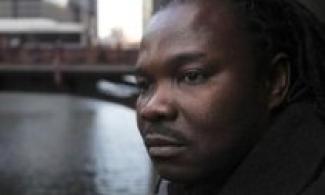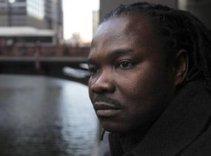
Feb. 28 (GIN) – Royal Dutch Shell, Europe’s biggest oil company, is at the center of a major test of U.S. law that allows foreign nationals to sue corporations in U.S. courts for claims of genocide, rape and other serious human rights abuses.

Feb. 28 (GIN) – Royal Dutch Shell, Europe’s biggest oil company, is at the center of a major test of U.S. law that allows foreign nationals to sue corporations in U.S. courts for claims of genocide, rape and other serious human rights abuses.
Shell seeks dismissal of the suit now before the U.S. Supreme Court filed by Nigerians seeking damages for torture and murders committed by their government in the early 1990s. Lawyers for the oil giant say the Alien Tort Statute, which dates to 1789, can’t be used to sue corporations.
The Nigerian plaintiffs claim there’s nothing in the law that limits liability to individuals.
The plaintiffs, from Ogoniland, are relatives of victims murdered by Nigeria’s former military regime which was allegedly recruited by Shell to eliminate the opposition to oil exploration in the Niger Delta.
"All that we're saying in this case is that when a corporation contributes to genocide or crimes against humanity, that they should be held liable ... the same way they would be held liable if one of their agents is engaged in an automobile accident that injures somebody" on the job, said Paul Hoffman, who is representing the Nigerians.
But according to Shell: “Even if the corporation had jointly operated torture centers with the military dictatorship in Nigeria to detain, torture and kill all opponents of Shell’s operations in Ogoni, the victims would have no claim.”
The case could have wide implications for U.S. companies that operate abroad under the cover of repressive regimes.
Among the Ogoni victims was Nigerian writer and activist Ken Saro-Wiwa. He and 8 others were executed in 1995 after what plaintiffs said was a sham trial by a military tribunal, backed by the oil giant.
Also bringing charges is a Seventh-day Adventist bishop and a local leader's widow, who was raped and beaten after her husband was arrested and summarily executed.
Survivor Charles Wiwa, now living in the U.S., recalls being picked up and beaten by 18 soldiers after he led a rally in his home village. "They started beating me — horsewhipping me, clubbing me, [kicking me with their] boots for a really long time," Wiwa says. The beating lasted more than two hours.
The U.S. government, the United Nations High Commissioner for Human Rights and numerous human rights organizations have filed briefs supporting the victims' argument that the Alien Tort Statute does allow for corporate liability. Backing Shell are more than two-dozen multinational corporations, business groups, and even several countries — Germany, the Netherlands and the United Kingdom.
A decision in the case is expected by the summer. w/pix of C. Wiwa
MANDELA’ S SHOES TOO BIG TO FILL?

Feb. 28 (GIN) – The overnight hospital visit by former president Nelson Mandela was enough to raise fears of the mortality of the man whose life set a standard of courage, sacrifice and reconciliation.
The temporary health crisis sparked reflection on the current crop of African leaders clinging to power despite advanced age or rules against serving endless terms.
Even the choice of hospital – in South Africa, not Saudi Arabia or the UK – made Mandela a standout to Nigerian writer Okey Ndibe .
“For any Nigerian big man to be treated in a Nigerian hospital is nothing short of a curse,” said Ndibe, adding: “Nigerian “stakeholders” take for granted the right to receive medical care abroad, to drink imported water, to power their homes with imported generators, to educate their children abroad, to own swanky mansions in Europe, North America, or the UK – with money looted from Nigeria…
“Nobody doubted that (Mandela) received his people’s mandate in a credible election, free of hanky-panky. He could have easily sailed into a second term, but he gracefully withdrew, asking younger elements within his party to rise to the challenge of leadership…”
The 93 year old Mandela was released from hospital Sunday after minor surgery to determine the cause of an abdominal complaint. Well-wishers had prayed for Mandela at Regina Mundi church in Soweto, a former centre of anti-apartheid protests and funerals. w/pix of Mandela
SENEGALESE PRESIDENT, IN SETBACK, TO FACE VOTERS IN A SECOND ROUND
By Fungai Maboreke

Feb. 28 (GIN) - Senegalese President Abdoulaye Wade is headed for a run-off after failing to get 50% of votes cast in the midst of unprecedented pre-election violence.
Presidential spokesperson, Amadou Sall, observed: “The numbers are clear, we are headed to a second round.”
Wade is likely to run against former Prime Minister Macky Sall in his bid for a third term. Early unofficial results - with more than half of the vote counted - gave Mr Wade 32%, with Sall pulling 25%. There were 12 other candidates. According to Mr. Sall, they have all agreed to unite behind whoever emerged as Mr. Wade’s challenger.
The President cast his vote Sunday amid jeers and boos from disgruntled citizens.
“What has happened has been the most bloody and blood-filled campaign the country has ever known,” said commentator Arame Tall on the news show Democracy Now. “We’ve had 10 elections since independence. Every one of them has had its ups and downs… But this year, 12 people died protesting Wade’s attempt to have a third term, which the Constitution clearly does not allow him to do.”
“Wade was our Obama in year 2000… He came with the slogan of change – Sopi - in Wolof.
“So when he tried to groom his son to succeed him, people resented it… now the youth has turned its back on him. And that’s a monumental change.”
Run-off elections are expected to be held on Mar. 18. w/pix of A. Wade
NEW BOOK CONFIRMS COLONIAL LINK TO AIDS IN AFRICA
Feb. 28 (GIN) – A Washington Post editor and a professor at the University of North Carolina have completed a new book that erases any doubt that Western colonial powers sparked the AIDS epidemic and then fanned its rise.
Tinderbox, to be released Mar. 1, “overturns the conventional wisdom on the origins of this deadly pandemic,” notes the publisher’s release.
Reviewer Robert Dreyfuss in The Nation magazine, wrote: “Maybe it’s too much to say that imperialism caused AIDS. But at the very least, it’s karma—payback, if you will, for mass slaughter, slavery and vicious exploitation in central Africa more than a century ago.”
“The penetration of Africa by Belgians, Germans and other colonialists in the late nineteenth century not only brought syphilis to Africa, a disease that killed countless Africans, but unleashed the AIDS virus, too,” Dreyfuss deduced from the book. From “a small patch of dense forest in southeastern Cameroon,” the virus traveled down a river system to the colonial outpost of Kinshasa sometime between 1880 and 1910 or so.”
“Tinderbox puts it all together in a way that shows the consequences of imperialism, colonialism and the attendant public health disaster that followed it,” Dreyfuss says.
Authors of the new book are Craig Timberg, former foreign correspondent in Africa, and now acting national security editor of The Washington Post, and Daniel Halperin,a senior HIV prevention adviser in the U.S. government’s global AIDS program and now an epidemiologist at the University of North Carolina. The book was published by Penguin Books.